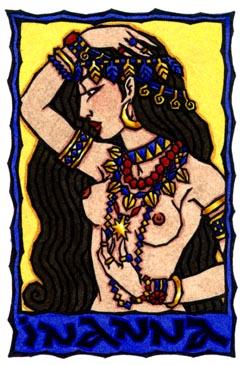It is commonplace for Christian critiques of Paganism to admonish us to "worship the Creator, not the creation." (See for example Focus on the Family's Dare 2 Dig Deeper: Breaking the Spell, a pamphlet for youth describing the so-called dangers of Wicca). The implication is that Pagans worship "creation," or nature. But to say that Pagans worship "the creation" is to commit the fallacy of begging the question: if we call nature "the creation," that presumes a creator. And most Pagans, like atheists, won't grant that there is a creator who stands outside of nature and creates, like a potter at his wheel. To make the point another way: Goddess is not the Judeo-Christian God in a skirt.
That is why the problem of evil isn't a problem for Wiccans and other Pagans. We don't believe in an all-knowing, all-powerful God who should have stopped the Holocaust, or Hurricane Katrina. (The problem of evil asks how such a God can also be all-good, given that he allows bad things to happen to his people.) Since Pagans don't believe in a vengeful or retributive God, we don't say stupid things such as, God visited the hurricane on New Orleans to punish the people for their sins.
Pagans don't believe in sin, and we don't believe in that God. Rather, we "believe in" the creative and destructive forces of the universe. We honor, not "worship," the cycles of nature. We believe in living in accord with nature and learning her lessons. For example, it is foolish to warm the seas, build a city below sea level, destroy the protective barrier wetlands and let the levees crumble, permit poverty to flourish among the people of that city, and have no plan for evacuation. A hurricane is a force of nature, but its severity and its impact on human lives have everything to do with humans taking responsibility, or failing to take responsibility, for our roles within nature. For we, too, are a part of nature. Human intelligence and human goodness are ours to use or forsake. We are given many gifts. But we accept few of them with humility or gratitude.
Starhawk says that human beings are co-creators with the Goddess. That reminds me of an old Jewish aphorism: "Why did God give us wheat and not bread? So that we would participate in creation." We are part of the creativity of nature. We are part of the conscious universe. By praying, performing ritual, and moving energy, we acknowledge our human role. We live not only in the more familiar, material world, with its vast resources, but also in a liminal space where we can converse with the spirits of place, the animals, and the ancestors. Our humility is not that of subject towards king, but of participants in the web of life and death. We can ask for help and guidance, just as we can offer those things when we are asked. By watching, listening, feeling, and applying our intelligence, we can learn our place in the fabric of things. With arrogance, hierarchy, greed, and willing submission, we kill ourselves and our earth. With humor, generosity, respect, humility, and loving kindness, we honor the Goddess, however we conceive of Her, and we honor ourselves.
Subscribe to:
Post Comments (Atom)

3 comments:
Just a thought,
Paganism, Religion, Atheism are one and the same. The took on different meanings due to the human propensity to distinguish by superficialities whilst looking past the fundamentals which make them the same. 'God', 'Creation', 'Godlessness' indicate a respective relocation of God, Creation or Godlessness. They are distinguished only by what they deem as 'God' and where they locate them, along with other subsidiary matters.
They are just denominations that take on various combinations in order to effect control or exhibit appreciation of whatever is deemed to be a higher power or one deserving of aesthetic appreciation.
Interesting perspective. I've bookmarked you so I'LL BE BACK! Looking forward to more of such stimuli from yourselves.
http://the-heretic.blogspot.com
That is a great post. Probably one of the best concise explanations of Pagan belief that I have seen anywhere.
Post a Comment